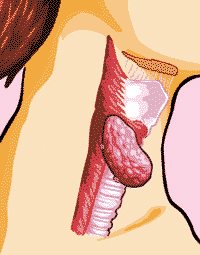Thyroid and Weight: Could Your Thyroid be
Effecting Your Weight?

Despite your attempts to maintain a healthy lifestyle by following a decent eating plan and exercise regularly, you just can't seem to get results. Perhaps you should have your thyroid checked out.
Your thyroid is a small organ that is situated in your neck area and is responsible for the delivery of hormones throughout the body. Among its many responsibilities, regulating weight is one of its main functions as it basically controls the body's metabolism.
When the thyroid is affected, serious thyroid problems such as hypothyroidism (under-active thyroid) or hyperthyroidism (over-active thyroid) could occur, both of which result in weight-related problems.
Hypothyroidism is when the thyroid becomes under-active and it can therefore not deliver the appropriate levels of hormones to the body. At this level, people who suffer from this type of thyroid problem begin to gain an almost unexplainable amount of weight. Symptoms of an under-active thyroid include fatigue, hair loss, course hair, a decreased libido, abnormal menstrual cycles, depression, irritability, loss of memory, constipation, weakness, dry skin, rough skin, muscle cramps, weight gain or unexplained difficulty to lose weight.
On the other hand, hyperthyroidism works in the complete opposite way. The thyroid becomes over-active and as a result, people who suffer from this condition start to lose weight; in some cases, too much weight. Symptoms of an over-active thyroid include rapid heart palpitations, insomnia, nervousness, feeling out of breath, fatigue, light or no menstrual cycles or increased bowel movements. Other signs include a rapid heart rate, shaking, weakness in muscles, hair loss, warm and moist skin and weight loss.
If you feel that you have a thyroid condition, it is advisable to seek immediate medical attention to ensure that it can be treated before it becomes too serious.
|